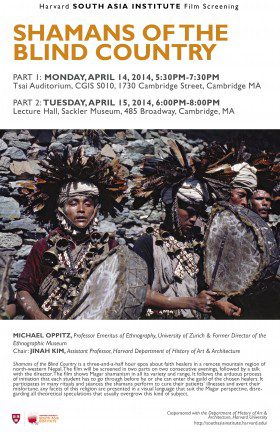SAI Film Screening
Part 1: April 14, 5:30 PM, Tsai Auditorium, CGIS S010, 1730 Cambridge Street, Cambridge MA
Part 2: April 15, 6:00 PM, Lecture Hall, Sackler Museum, 485 Broadway, Cambridge, MA
Michael Oppitz, Professor emeritus of ethnography, University of Zurich & former director of the Ethnographic Museum
Chair:Jinah Kim, Assistant Professor, Department of History of Art & Architecture
Shamans of the Blind Country is a three-and-a-half hour epos about faith healers in a remote mountain region of north-western Nepal. The film will be screened in two parts on two consecutive evenings, followed by a talk with the director.
The film shows Magar shamanism in all its variety and range. It follows the arduous process of initiation that each student has to go through before he or she can enter the guild of the chosen healers. It participates in many rituals and séances the shamans perform to cure their patients’ illnesses and avert their misfortune. any facets of this religion are presented in a visual language that suit the Magar perspective, disregarding all theoretical speculations that usually overgrow this kind of subject.
Part I ( to be screened on April 14th) displays a variety of healing rituals carried out by the shamans in the Dhaulagiri region. Part II ( to be screened on April 15th) of the film focuses on the transmission of the shaman’s knowledge from master to pupil. This is an oral transmission; no books are involved. It all happens in séances, where the pupil is requested to watch and imitate the master’s performance. This means manufacturing the required utensils and paraphernalia, preparing a sacred spot or altar, performing the operations in the right order, and above all, learning the mythical chants, the origin stories and auxiliary chants, echoing the master line by line to the beat of his drum.
Michael Oppitz, born 1942 in Silesia (now Poland); schooled in Cologne, studied anthropology, sociology and sinology at Berkeley, Bonn and Cologne; dissertation 1974; post-doc 1986; professor at Zurich University from 1991–2008 and director of the city’s Ethnographic Museum; extensive field research in the Himalayas 1965–2010; a dozen books on anthropology; various short films.
Cosponsored with the Department of History of Art & Architecture, Harvard University

